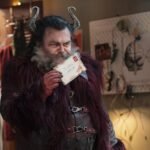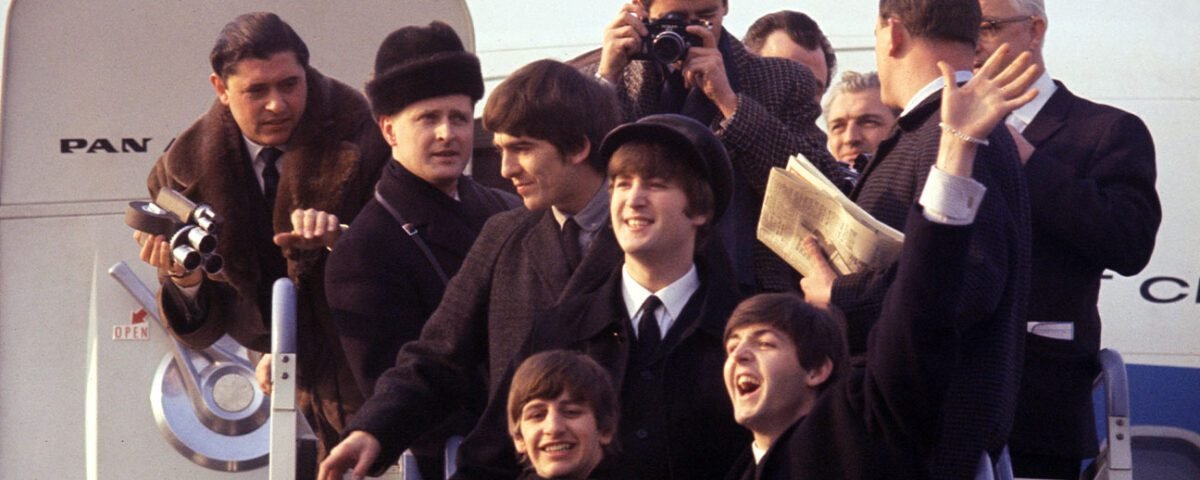


‘Dear Santa’ Review: A Devilishly Fun Jack Black Elevates Paramount+’s Mediocre Holiday Comedy
November 26, 2024


‘Moana 2’ Review: Auli’i Cravalho and Dwayne Johnson in a Visually Dazzling but Narratively Uninspiring Sequel
November 27, 2024Produced by Martin Scorsese, David Tedeschi’s film threads contemporary interviews and historical context through rare footage shot by the Maysles brothers.
Beatles ’64
A real-life rehearsal for ‘A Hard Day’s Night.’
A clip in Beatles ’64 features Canadian media theorist Marshall McLuhan making a salient observation: “The chances of your understanding anything going on in your own time are very small, except through the means provided by artists. Artists are people who enjoy living in the present.” That perspective is both supported and disproven by the film’s candid access to John, Paul, George and Ringo — surnames not required — on the cusp of global superstardom during their first visit to America in 1964.
Fab Four documentaries have become a virtual cottage industry, to the point where you wonder if there’s anything left to add. But David Tedeschi’s film for Disney+ — produced by Martin Scorsese alongside surviving Beatles Paul McCartney and Ringo Starr and family representatives of John Lennon and George Harrison — has an ace up its sleeve. That’s the extensive fly-on-the-wall footage shot by direct cinema pioneers Albert and David Maysles over 14 whirlwind days, starting with the Beatles’ arrival at JFK International Airport in New York.
That seems astonishing when you see shots in which moments from 60 years ago still surge with vitality. I gasped at the poetry of a sequence captured from inside a car with the Beatles, as a young man pointing an 8mm camera at them races along the street beside the vehicle, and then gets left behind just as a cop on horseback comes into view.
Tedeschi worked with Scorsese as an editor on Rolling Thunder Revue, the two-part doc George Harrison: Living in the Material World and the short-lived scripted series Vinyl before graduating to co-director on 2022’s Personality Crisis: One Night Only, about musician David Johansen.
The director’s experience with music-related films serves him well here in an adroit assembly of Maysles footage (reinvigorated by a 4K restoration), archival material and contemporary interviews that contextualize the time capsule in ways both entertaining and enlightening.
There’s just as much focus on the cozy kitchen scene of a random family watching the broadcast, the eldest teenage daughter sitting up close, glued to the screen. That scene is mirrored by shots of Leonard Bernstein’s considerably more affluent family assembled in their living room for the same purpose, as daughter Jamie Bernstein recalls marshaling them all for the occasion.
Earlier, she’s among the fan commentators who tasted the electrifying atmosphere of the Beatles’ New York arrival firsthand. Musing six decades years later on all the squealing and hyperventilating excitement, Bernstein discusses the urgent, visceral need to express something primal, especially for adolescent girls early in the process of sexual self-discovery. Her father, a renowned music educator as well as a composer and conductor, was a conspicuous voice urging fretful Americans not to dismiss the music but to listen to what the songs had to say.
Early hits like “Love Me Do,” “She Loves You,” “I Want to Hold Your Hand,” “All My Loving” and “With Love From Me to You” were catchy bops with almost interchangeably simple, nonsexual lyrics that tapped directly into teenagers’ inchoate ideas of romance. Crowd footage speaks for itself in showing that the power of those songs to convey raw emotion transcended lines of race and class. In one favorite moment, a Juilliard student with an armful of classical music scores expresses disdain for rock ‘n’ roll but makes an exception for the Beatles.





